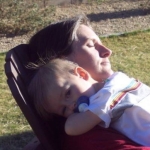Public Group
Active 1 month ago
All members can join this group (by simply clicking the “Join Group” blue button below). This group is a place for members to ask questions, share or seek support relating to any of the eCourses in this Peaceful Parent Village.
You can access the eCourses or this group at any time through the drop-down menu under your profile picture in top menu. Optionally, you can post in the main Village forum.
Module 6 Step by Step Course
Tagged: ecourse, stepbystep
- This topic has 9 replies, 5 voices, and was last updated 4 years, 8 months ago by
 Meg Rodney.
Meg Rodney.
-
AuthorPosts
-
-
16/11/2019 at 8:31 am #10378
 Tabitha JonsonKeymaster
Tabitha JonsonKeymasterHi everyone,
We’re conscious that people are all at different point in the eCourse and that’s totally fine! Some people are working through mdules 3/4 and some are heading into module 6.
In Module 6 we look at how we can connect with our children before we make requests. This can really help with cooperation. We look at the stress cycle and how that impacts on our ability to centre and importantly, our relationship with our children and how it can lead to disconnection and then lack of cooperation
Regardless of which Module or unit you’re at, what’s one of your insights? What’s a question or a niggle that it’s brought up for you? What if anything do you wish you had learned a year or more ago?
-
17/11/2019 at 10:07 am #10381
 Lesley GouldParticipant
Lesley GouldParticipantHi Tabitha
I have just finished Module 5 and am away to start Module 6 soon. I am really hoping it helps with my understanding of how best I can deal with situations when I feel my kids are testing the boundaries!
I.e. yesterday, I was sorting out washing in Esme’s room and folding clothes on her bed. I had them in neat piles to put away and Esme was playing in her room. She then came up and sat on the bed and started to shake the duvet, therefore making the clothes all move too! Which was mixing them all up. I asked her to stop shaking the duvet, which she didn’t, and shook it even more suddenly which meant all of the clothes went on the floor! I did something I don’t do very often, and shouted “Esme!” at her. To which she got a fright and started crying, which made me feel really awful of course. We had a big cuddle and she said “I got a fright Mummy” and I listened to her and gave her lots of comfort, but I don’t really know how I should have handled it?
Then today, I was in the shower and Esme was just hanging out in the bathroom with me. She picked up the toothpaste and started squeezing it on to the sink! I said to her “I really would like you to stop squeezing the toothpaste Esme as it is making a mess” To which she looked at me, then squeezed it even more!
So, basically, testing the boundaries, I think, and being a wee monkey. And I am hoping Module 6 helps me to think about how better to deal with these situations!
I hope that makes sense!
-
18/11/2019 at 12:03 pm #10384
 Meg RodneyKeymaster
Meg RodneyKeymaster@lesleyg – I really think that Module 6 will be so helpful with the issues you described with Esme. I think this module will help you shift to a “how can I help Esme cooperate in this moment?” perspective, and I think the ideas about play will really help in both these scenarios you mentioned. Once you finish module 6, I’d love to hear if anything resonates with you.
-
19/11/2019 at 1:07 pm #10396
 Nicola StunellParticipant
Nicola StunellParticipantI saw a perfect example of the stress cycle in action this morning as we were getting ready to get to school, luckily with a bit of fun and laughter we were able to get out of it and reconnect to get out the door even if it was a little bit late.
My question is how on earth do you make those things you just have to do every morning fun? Or how do you help your child feel intrinsically motivated to do the tasks?
-
20/11/2019 at 10:25 am #10400
 Tabitha JonsonKeymaster
Tabitha JonsonKeymasterNicola, those mornings and leaving the house can be soo stressful ah?
Don’t know that I’ve really succeeded in making them particularly fun or intrinsically motivating but I’ve tried to just bring a positive attitude to helping them develop those habits. Oh and always plan more time that I thought we’d need!!
When they were little we had a morning and evening pictorial chart and the could choose the order of the tasks. They had a bird and an owl on them so I’d say, “Chrip, chip. Oh what’s the morning bird saying??? Let’s check”Once they sort of outgrew the list I’ll say, “Oh what do we need to do this morning?” or “How are you going with … getting your shoes on / packing your bag?” or “Do you need some support to …”
Tt does mean for some time I’m still really involved even though I might feel they’re capable of doing it themselves. That connection really helps them stay on track.Some stuff now they’re really independent with and some stuff (like newer/bigger or boring tasks) they still the connection and support.
We do add in weird stuff like talking to belongs, “Shoes, where are you?? Are you hiding from me??” Or singing to each other. “To the car, to the car, everybody to the car.”
And still sometimes the rush of leaving the house is really hard!! My eldest really struggles with rushing and pressure so he’s helped me learn to just take a wee break and then go again as pushing him makes it sooo much worse. I’ll sometimes just pause and say out loud. “I’m feeling a bit rushed and overwhelmed. Ok I just need to think through what we need to do. We can do this.” And I’ve noticed my youngest in particular will do the same sort of thing when cleaning the art table or her room. Kind of talk herself through it.
-
20/11/2019 at 10:31 am #10401
 Tabitha JonsonKeymaster
Tabitha JonsonKeymasterOh and also there’s a zoom video about transitions that talk about some of the strategies for that sort of thing. It’s me not Gen. Eeeek!!
For some reason the link is not working but if you go to the Resource Library and look for Tips for Smoother Transitions in the Videos section.
https://www.peacefulparent.com/transitions*** I’ve edited the link so the preview shows up
-
20/11/2019 at 12:59 pm #10404
 Genevieve SimperinghamKeymaster
Genevieve SimperinghamKeymasterYes Lesley I agree with Meg, that I do hope that Module 6 is going to really help, especially all the focus on; connect then request. Another good one to remember is connection before correction. For instance on the bed when she was messing up the clothes, perhaps when she first messed them up she wasn’t away that her actions of maybe landing on or bouncing on the bed over enthusiastically was going to undo your hard work. At this age they don’t really have the theory of mind developed, which means that they’re just so in the moment in their own world and really struggle to imagine how this action is going to impact the other person. What can easily happen is the child accidentally causes a mess or another job to be done, the parent is understandably a bit frustrated and that comes through in their tone of voice or body language. Then when the child picks up that their parent is a bit frustrated they can feel a bit insecure about the connection, yet instead of just doing what they’re asked to do, there’s an emotional reaction and that little bit of defiance kicks in. It’s a very basic attempt (be it unconscious even) on the child’s part to communicate through their defiance or push back that they’re feeling insecure / unhappy / judged or otherwise a grumpy feeling.
But with time and practice we get better at firstly identifying that this is what’s going on, and hence being quicker to bring back in the connection and reassurance. And we get better at communicating our requests in a way that the child is more likely to WANT to cooperate. So perahaps bringing in a bit of warm affection might have reached her better (or you could try this and see if it makes a difference). So maybe stop what you’re doing, look directly at her and affectionately rub her arm or back or take her hand and say “Esme sweetheart, can you see how the piles of clothes move when you move around on the bed? (pause for her to focus her attention) then “let’s see how still we can both sit on the bed while we’re chatting so that the piles don’t go tumbling onto the ground”. Affection and connection help our child enter our world, which is a big journey for them to make. Also any little bits of humour, even exaggerated facial expressions can really help.
The same with the toothpaste. Immediately know that it’ll be hard for her to shift her awareness and attention to what you’re asking so make it as easy for her as you can. Perhaps one hand on her body and the other hand held open directly in front of her and ask her to hand the toothpaste to you both lightly but assertively “I’ll take the toothpaste now honey”. Again it’s more how you say it rather than what you say.
-
21/11/2019 at 7:59 pm #10430
 Genevieve SimperinghamKeymaster
Genevieve SimperinghamKeymasterLesley and Nicola,
The video/ audio / text on this post came to mind as one that might be helpful for both of you. I went to grab it when I first read this then remembered the problem that you iPhone folks have with the Amazon S3 links. Apple can be very stubborn about integrating with other platforms, but I’ve been searching for a solution and have been in the process of getting set up with a new system called SendOwl. I’ve uploaded the audio as a free product to my new SendOwl account. Do let me know if this works and if it’s a simple enough process. If it is, then I’ll start to do the same for other downloads in the member’s areas.
https://www.peacefulparent.com/video_peacefully_helping_kids_get_dressed/
Click the blue Download Audio button. You’ll be asked for an email address then given immediate access. I’ll be keen to hear if this seems like a good solution for you iPhone users. -
23/11/2019 at 3:57 am #10475
 Lesley GouldParticipant
Lesley GouldParticipantHi all, thank you for your replies, it all makes a lot of sense! I am trying so hard this week, since starting Module 6, to really try to connect before we do anything. I find transitions the hardest when I need to get to work as I think the kids pick up on the fact I am stressed too (as I really need to be somewhere) and it makes them more unable to carry out transitions easily. Other times when I don;t need to get to work are so much easier as the time pressures are not as intense. I really need to work on these times more. I will definitely watch the video you posted this weekend @peacefulparent and finish working through Module 6. It is really helping me in my thought process, its just the putting it all into practice I need to keep working on!!
-
23/11/2019 at 11:31 pm #10480
 Meg RodneyKeymaster
Meg RodneyKeymaster@lesleyg – oh, yes! Transitions when stressed/hurried are the hardest, aren’t they? So tricky to stay connected or to reconnect when feeling rushed and frazzled. And it is so true that our kiddos pick up on those tensions, and that creates even more tension and stress. I have found that those situations are where having a little mantra can be helpful for kind of ‘emergency centering’ for me (I particularly like Gen’s phrase, “this is tricky, not tragic”).
It sounds like this is all making sense and pieces are falling into place for you at the head level. Putting things into practice is challenging! Over time, it will become second nature, but it takes time. Be sure to remember to be gentle with yourself when you mis-step – those moments can be great opportunities to model kindness to self and forgiveness.
-
-
AuthorPosts
- You must be logged in to reply to this topic.
